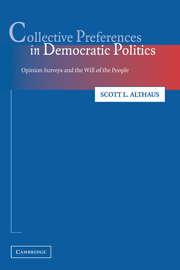Book contents
- Frontmatter
- Contents
- List of Figures and Tables
- Acknowledgments
- 1 Introduction
- PART I ILLUSIONS OF AGGREGATION
- PART II INFORMATION EFFECTS IN COLLECTIVE PREFERENCES
- PART III OPINION SURVEYS IN DEMOCRATIC POLITICS
- 7 Opinion Surveys and the Will of the People
- 8 What Surveys Can Tell Us about Public Opinion
- Appendix A Political Knowledge Indices
- Appendix B Methodology
- References
- Index
8 - What Surveys Can Tell Us about Public Opinion
Published online by Cambridge University Press: 06 January 2010
- Frontmatter
- Contents
- List of Figures and Tables
- Acknowledgments
- 1 Introduction
- PART I ILLUSIONS OF AGGREGATION
- PART II INFORMATION EFFECTS IN COLLECTIVE PREFERENCES
- PART III OPINION SURVEYS IN DEMOCRATIC POLITICS
- 7 Opinion Surveys and the Will of the People
- 8 What Surveys Can Tell Us about Public Opinion
- Appendix A Political Knowledge Indices
- Appendix B Methodology
- References
- Index
Summary
Is public opinion a beloved but unreal myth like the unicorn? Or a thing out there in the garden like an elephant, of which sight-impaired, competing methodologists measure different parts? Or a fuzzy set of probabilities like the electron, both wave and particle, perhaps of inherently uncertain location? Or does it include all of the above? … If we want to measure public opinion, we need to decide which of several meanings we are interested in.
– Allen Barton (1998)The problem is not what public opinion is, but what different sets of beliefs lead us to do with it in the development and conduct of systems of politics.
– David Minar (1960: 44)When V. O. Key (1966) described the public as an “echo chamber,” he underscored the importance of political leadership to the quality of the public's collective decisions. So long as the public was provided with good information and clear alternatives, Key argued, it would make reasonable and even responsible choices. This book has argued to the contrary that the public as an echo chamber is not acoustically perfect, and that the quality of collective preferences is not merely a function of the leadership and information provided to citizens. The low levels and uneven social distribution of political knowledge ensure that collective preferences reflect some voices better than others, and despite the optimism of revisionist arguments to the contrary, the mass public is often unable to compensate for its inattentiveness to politics.
- Type
- Chapter
- Information
- Collective Preferences in Democratic PoliticsOpinion Surveys and the Will of the People, pp. 277 - 313Publisher: Cambridge University PressPrint publication year: 2003



